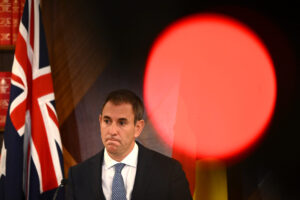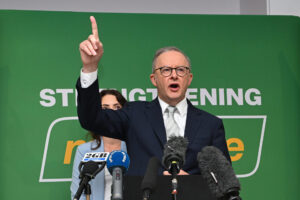While Australia sticks to accounting tricks, calls by other countries are growing to impose a carbon price on our export

Who would have thought that Scott Morrison would be the one to reintroduce a carbon tax? And who would have thought it possible to design a carbon tax on Australian polluters that delivered revenue to the treasuries of other countries? Welcome to the topsy-turvy world of “border tax adjustments” in which other countries get to decide the amount of tax that Australian polluters pay, and the way in which they will pay it.
For decades, the Australian climate debate has circled pointlessly around the hypothetical question of what would happen to Australian exporters if Australia were the first country to take climate action seriously. We might as well debate the consequences of Australia being the first country to roll out the internet.
Other countries have slowly but surely reduced their emissions from energy, industry and transport, while Australia’s emissions from those sources continue to climb. And while Australia sticks to accounting tricks, calls by other countries are growing to impose a carbon price on Australian exports whether we like it or not.
Australia taxes imports all the time. We impose import tariffs on goods ranging from passenger vehicles to clothing and footwear. Total revenue from tariffs is expected to be $1.7bn this year. We impose bigger import taxes on many kinds of clothing than we do on cars. And thanks to our so-called “free-trade agreements”, we charge different countries different amounts of tax on different goods all the time. While it’s not considered polite to talk about, Australia is often accused by its trading partners of using our restrictions on imports to protect domestic manufacturers from import competition.
Just as our “free” trade agreement with Japan did not remove Japanese restrictions on rice imports from Australia, it’s now likely – if not inevitable – that our trading partners will begin to place restrictions, or even carbon prices, on emissions-intensive imports from countries such as Australia that refuse to introduce a carbon price of their own.
While it might seem radical to suggest such an idea, it happens all the time. Not only does Australia impose tariffs on some products from some countries, we impose the GST on most, but not all, of the products that we import. Other countries have similarly sophisticated tax collection systems in place, and the benefits to those countries of aiming their tax systems at the “embodied emissions” in exports from countries like Australia are growing as rapidly as the gap between Australia’s climate ambition and the world’s.
While the idea of a “borders tax adjustment” is neither new nor complicated, the economics, politics and diplomatic consequences of the idea have changed radically in recent decades. For example, when Dr Hugh Saddler and Frank Muller first wrote about the idea 15 years ago, there was still some chance that Australia may have “led the world” in its approach to carbon pricing. In turn, a border tax adjustment would have allowed for the refund of any carbon price paid by Australian businesses when their exports left Australian shores.
But, as their more recent paper points out, now that the EU and the US are looking seriously at imposing their own carbon prices on imports from high-emitting countries like Australia, border tax adjustments are now a threat to the export competitiveness of climate laggards like Australia.
If Australia designed and implemented its own carbon pricing regime we would have some control over its timing, scope and size. But having decided instead to repeal the Labor-Greens carbon price back in 2014, the impact of carbon pricing on Australian exporters will instead be determined in Brussels and Washington.
Take aluminium, for example. Aluminium made in Tasmania is made almost entirely from renewable energy, while aluminium made in New South Wales and Victoria relies heavily on coal for electricity. While an Australian designed carbon price would have virtually no impact on the cost of Tasmanian aluminium production, when the Europeans and Americans start imposing carbon prices on our exports at their borders, does anyone think they will distinguish between Tasmanian and Victorian aluminium?
It’s no accident that, at precisely the same time as Australia is in a trade war with China, our closest allies would start to threaten trade restrictions on our emission-intensive exports. They might be our friends, but it’s their job to pursue their own interests. Calls for border taxes on “embodied emissions” in the EU and the US unite both populist protectionists and environmentalists. And the harder China squeezes Australian imports, the more leverage our other trading partners have over us.
There’s no doubt that Morrison can prevent the passage of a carbon price through this parliament. And just like it’s the rest of the world that decides how much Australian coal they will buy, there’s no doubt it’s the rest of the world that will decide whether a carbon tax is imposed on Australian exports. But why let economic or diplomatic reality get in the way of domestic politics?
Between the Lines Newsletter
The biggest stories and the best analysis from the team at the Australia Institute, delivered to your inbox every fortnight.
You might also like
Tax reform isn’t hard – slug multinationals and subsidise the things we want more of
Taxes are the price we pay for civilisation, but they are also a tool we can use to change the shape of our economy, not just its size.
How the government is setting everyone up to fail on green claims
If a private company ran a scheme that misled consumers, inflated investor confidence, and exposed its clients to legal risk, we would expect the government to shut it down.
Business groups want the government to overhaul the tax system? Excellent – we have some ideas.
The landslide win by the ALP has seen business groups come out demanding the government listen to their demands despite having provided them no support, and plenty of opposition, over the past 3 years.



